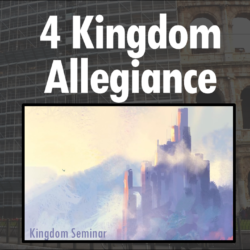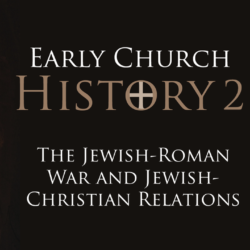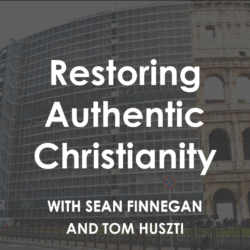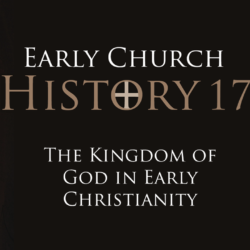 Like all kingdoms, God’s kingdom is political in nature. As a result, the kingdom requires allegiance from its citizens. By examining Jewish messianism and Roman political sensibilities, you’ll come to better see how early Christians prioritized their allegiance to the age to come over their local and national allegiances.
Like all kingdoms, God’s kingdom is political in nature. As a result, the kingdom requires allegiance from its citizens. By examining Jewish messianism and Roman political sensibilities, you’ll come to better see how early Christians prioritized their allegiance to the age to come over their local and national allegiances.
This is lecture 9 of the Kingdom of God class, originally taught at the Atlanta Bible College. To take this class for credit, please contact ABC so you can do the work necessary for a grade.
Notes:
two parts:
- Jewish Messianism
- Roman Allegiance
politics and religion were not separate realms in antiquity
Other leaders of messianic movements:
- Athronges (4 bc)
- Judah the Galilean (ad 6)
- the Samaritan Prophet (ad 36)
- Theudas (ad 45)
- the Egyptian Prophet (ad 58)
- Simon bar Giora (ad 69)
- Simon ben Kosiba (ad 132)
the Roman empire always perceives the leaders of Jewish messianic movements as threats and moves decisively to eliminate them
I bring up these leaders of messianic and quasi-messianic movements to contextualize Jesus
- he knows what he’s doing
- and he’s smart about it
Messianic Secret
- messianic secret: Jesus kept the fact that he claimed to be the messiah a secret
- Jesus had been extremely careful up to this point
- casting out many demons
- Luke 4.40-41
40 Now when the sun was setting, all those who had any who were sick with various diseases brought them to him, and he laid his hands on every one of them and healed them. 41 And demons also came out of many, crying, “You are the Son of God!” But he rebuked them and would not allow them to speak, because they knew that he was the Christ.
- Luke 4.40-41
- Peter’s Confession (Mark 8.27-30)
- Matthew 16.15-20 15 He said to them, “But who do you say that I am?” 16 Simon Peter replied, “You are the Christ, the Son of the living God.” 17 And Jesus answered him, “Blessed are you, Simon Bar-Jonah! For flesh and blood has not revealed this to you, but my Father who is in heaven…20 Then he strictly charged the disciples to tell no one that he was the Christ.
until…the Triumphal Entry
- Mark 11. 7-11
7 And they brought the colt to Jesus and threw their cloaks on it, and he sat on it. 8 And many spread their cloaks on the road, and others spread leafy branches that they had cut from the fields. 9 And those who went before and those who followed were shouting, “Hosanna! Blessed is he who comes in the name of the Lord! 10 Blessed is the coming kingdom of our father David! Hosanna in the highest!” 11 And he entered Jerusalem and went into the temple. And when he had looked around at everything, as it was already late, he went out to Bethany with the twelve. - three coded actions
- riding the donkey
- waving palm branches
- called “Son of David”
Riding the Donkey
By riding the donkey Jesus provocatively fulfilled Zechariah’s prophecy.[1]
- Zechariah 9.9-10
9 Rejoice greatly, O daughter of Zion! Shout aloud, O daughter of Jerusalem! Behold, your king is coming to you; righteous and having salvation is he, humble and mounted on a donkey, on a colt, the foal of a donkey. 10 I will cut off the chariot from Ephraim and the war horse from Jerusalem; and the battle bow shall be cut off, and he shall speak peace to the nations; his rule shall be from sea to sea, and from the River to the ends of the earth.
Palm Branches & Coats in the Road
coats in the road
- symbols have meaning, especially nationalistic symbols (flag, bald eagle)
- When Israel declared Jehu king, “they all took their cloaks and spread them for him on the bare steps” (2 Kings 9.13).
palm branches
- symbol of nationalism
- coins
- John Hyrcanus (134-104 bc)
- Alexander Jannaeus (104-76 bc)
- Simon ben Kosiba (ad 132/3)
- In Revelation we encounter a scene of people “wearing white robes and holding palm branches in their hands,” proclaiming salvation (Revelation 7.9-10).
Wright explains:
“You don’t spread cloaks on the road—especially in the dusty, stony Middle East! – for a friend, or even a respected senior member of your family. You do it for royalty. And you don’t cut branches off trees, or foliage from the fields, to wave in the streets just because you feel somewhat elated; you do it because you are welcoming a king.”[2]
R. T. France calls the triumphal entry Jesus’ “blatant messianic self-advertisement.”[3]
- triumphal entry is Jesus publicly announcing his claim to be God’s messiah.
- Jesus knows what he is doing;
- he knows the cost;
- and does it anyhow.
consider for a moment how Jesus died?
- titulus: Jesus of Nazareth King of the Jews
- the titulus tells us what the Romans were thinking when the executed Jesus—the thought he claimed to be a king…and they were right!
- that’s what messiah means!
- one God anointed as king
- every time a Christian says “Christ” that’s what they mean
resurrection proves that Jesus’ radical messianic claim is true!
- Christian missionaries start going out from the land of Israel into the Roman world preaching Jesus as Lord, Savior, son of God, King, and that they have citizenship in his coming kingdom
- they are radically loyal to the Messiah, giving total allegiance
- Roman torture and execute Christians on charge of treason
in order to explain this more, we have to consider how Romans thought about the emperor
Battle of Actium
it was Sept 2, 31 bc on the Ionian Sea at Actium, Greece
Octavian vs. Mark Antony & Cleopatra
Octavian had
- 250 war ships called galleys, propelled by rowers
- 16,000 infantry
- 3,000 archers
Marc Antony had
- 290 war ships
- 20,000 infantry
- 2,000 archers
by the end of the day
- 7,500 killed in action
- 200 ships sunk or captured
the great naval battle of antiquity
at midday Antony finally had to join the battle
- Cleopatra got spooked and gave a signal to retreat
- just then the wind favored an escape
- Egyptian ships soon sailed out of sight
- everyone lost their nerve and started panicking
- Antony himself fled
- Octavian kept fighting all night, burning many ships
- eventually Antony and Cleopatra committed suicide
this marks the transition from the Roman Republic to the Roman Empire
- Octavian took the name Augustus
- known to history as the first emperor
- there would be someone claiming that title for another 1500 years
- this is Rome’s “revolutionary war battle”
Sextus Propertius composed this tribute:
“My songs are sung for Caesar’s glory; while Caesar is being sung, do even you pray attend, Jupiter…Where a bay lulls the roar of the Ionian Sea…hither came to battle the forces of the world…Apollo, leaving Delos…stood over Augustus’ ship…Anon he spoke: “O savior of the world…Augustus…now conquer at sea: the land is already yours: my bow battles for you.”…Father Caesar from the star of Venus looks marveling on: “I am a god; this victory is proof that you are of my blood.” (Sextus Propertius, Elegies 4.6)
not so different from our National Anthem
O say can you see by the dawn’s early light,
What so proudly we hailed at the twilight’s last gleaming,
Whose broad stripes and bright stars through the perilous fight,
O’er the ramparts we watched, were so gallantly streaming?
And the rockets’ red glare, the bombs bursting in air,
Gave proof through the night that our flag was still there;
They immediately erected a monument in the sea where the battle happened:
“Imperator Caesar, son of God, following the victory in the war which he waged on behalf of the republic in this region, when he was consul for the fifth time and imperator for the seventh time, after peace had been secured on land and sea, consecrated to Mars and Neptune the camp from which he set forth to attack the enemy now ornamented with naval spoils” (between 31 and 29bc)
Right after the battle, the governor of Asia, Paulus Fabius Maximus, requested to honor Augustus by changing the calendar, making his birthday the beginning of the year.
Eventually this was granted and this is the inscription:
“Since the providence that has divinely ordered our existence has applied her energy and zeal and has brought to life the most perfect good in Augustus, whom she filled with virtues for the benefit of mankind, bestowing him upon us and our descendants as a savior—he who put an end to war and will order peace, Caesar, who by his appearing exceeded the hopes of those who prophesied good news, not only outdoing benefactors of the past, but also allowing no hope of greater benefactions in the future; and since the birthday of the god first brought to the world the good news residing in him…the Greeks of Asia have decided that the New Year in all the cities should begin on September 23, the birthday of Augustus…”
people applied “gospel” “son of God” and “savior” to Augustus following his victory at Actium
what on earth does all this have to do w/ Christianity, the bible, or “kingdom citizenship?”
Philippians 3.17-21
17 Brothers, join in imitating me, and keep your eyes on those who walk according to the example you have in us. 18 For many, of whom I have often told you and now tell you even with tears, walk as enemies of the cross of Christ. 19 Their end is destruction, their god is their belly, and they glory in their shame, with minds set on earthly things. 20 But our citizenship is in heaven, and from it we await a Savior, the Lord Jesus Christ, 21 who will transform our lowly body to be like his glorious body, by the power that enables him even to subject all things to himself.
Here Paul writes to the Jesus people in Philippi
- Philippi was made a Roman colony b/c it was the site where Octavian and Antony defeated the armies of the Brutus and Cassius who had assassinated Julius Caesar
- Octavian had settled many veterans there
- later after the battle of Actium and he became Augustus
- he settled more veterans in Philippi
- this city was rebuilt and designed to a be a miniature Rome
- people granted Roman citizenship and rights
- by the time Paul is writing to them the children and grandchildren of these veterans are there
- they had temples Julius, Augustus, and Claudius
look at the words he uses here in v20!
- he says “our citizenship is in heaven”
- he calls Jesus “savior”
- he calls him “lord”
- he calls him “Christ”
- he says we’re still waiting for our savior
- wait a second, isn’t Augustus the one who brought peace to land and sea?
- Paul’s like, big deal, Jesus is going to transform our bodies so we don’t die anymore!
- Paul takes the terms “lord” “savior” and applies them to Jesus in Philippians
we are so used to the separation of church and state, we find it difficult to understand how believing in Jesus was a political threat
Philippians 2.8-11 8 And being found in human form, he humbled himself by becoming obedient to the point of death, even death on a cross. 9 Therefore God has highly exalted him and bestowed on him the name that is above every name, 10 so that at the name of Jesus every knee should bow, in heaven and on earth and under the earth, 11 and every tongue confess that Jesus Christ is Lord, to the glory of God the Father.
- exaltation above all names
- every knee bows to Jesus as Lord
- two ways to bow: (1) willingly (2) forcibly
- Christians recognize Jesus’ authority and right to rule this world now
- that’s what “Jesus is Lord” means
- when early Christians said “Jesus is Lord” they meant 3 things
- rightful God-ordained ruler of the world
- “God has made him both Lord and Messiah” (Acts 2.36)
- give him complete allegiance
- if Caesar thinks he’s lord, that’s just not going to work
- even he tortures us
- agree to do what he says
- rightful God-ordained ruler of the world
this is actually how they got Jesus crucified:
John 19.12-16 12 From then on Pilate sought to release him, but the Jews cried out, “If you release this man, you are not Caesar’s friend. Everyone who makes himself a king opposes Caesar.” 13 So when Pilate heard these words, he brought Jesus out and sat down on the judgment seat …He said to the Jews, “Behold your King!” 15 They cried out, “Away with him, away with him, crucify him!” Pilate said to them, “Shall I crucify your King?” The chief priests answered, “We have no king but Caesar.” 16 So he delivered him over to them to be crucified…
it’s not like the misunderstood Jesus
- he really is a king
- he really is going to subdue all nations
- he really is a threat to the Roman Empire
- the Jews knew it, the Romans knew it, what about us?
so when the Jesus people started preaching Jesus as king, they ran into trouble
Acts 17.6-7 “These men who have turned the world upside down have come here also, and Jason has received them, and they are all acting against the decrees of Caesar, saying that there is another king, Jesus.”
Philippians 3.20-21 20 But our citizenship is in heaven, and from it we await a Savior, the Lord Jesus Christ, 21 who will transform our lowly body to be like his glorious body, by the power that enables him even to subject all things to himself.
NT Wright:
“‘We are citizens of heaven,’ Paul declares in verse 20. At once many modern Christians misunderstand what he means. We naturally suppose he means ‘and so we’re waiting until we can go and live in heaven where we belong.’ But that’s not what he says, and it’s certainly not what he means. If someone in Philippi said, ‘We are citizens of Rome,’ they certainly wouldn’t mean ‘so we’re looking forward to going to live there.’ Being a colony works the other way round. The last thing the emperors wanted was a whole lot of colonists coming back to Rome. The capital was already overcrowded and underemployed. No: the task of the Roman citizen in a place like Philippi was to bring Roman culture and rule to northern Greece, to expand Roman influence there.” NT Wright (Paul for Everyone: The Prison Letters, p. 124)
“It doesn’t just mean remaining constant in faith. It means giving allegiance to Jesus, rather than to Caesar, as the true Lord. Paul has described the church, and its Lord, in such a way that the Philippians could hardly miss the allusion to Rome and Caesar. This is the greatest challenge of the letter: that the Christians in Philippi, whether or not they were themselves Roman citizens (some probably were, many probably weren’t), would think out what it means to give their primary allegiance not to Rome but to heaven, not to Caesar but to Jesus—and to trust that Jesus would in due time bring the life and rule of heaven to bear on the whole world, themselves included. NT Wright (Paul for Everyone: The Prison Letters, p. 125-6)
gotta pledge allegiance to the kingdom of God
- means your loyalties are w/ this government over all others
we await the kingdom from heaven
- how do we work this out?
- we aren’t living in the Roman Empire
Christians are model citizens
- respectful and honoring of authorities
- compliant with laws
- pay taxes
However, the government feels threatened by them and executes them
- Jesus
- Peter
- Paul
How should kingdom citizenship affect our lives today? I don’t think it means we can’t be patriotic, but it certainly limits it. It’s proper to feel an attachment to one’s homeland and gratitude for a country that enables human flourishing. However, at its heart Christianity is transnational, embracing believers from every tribe, nation, and language (Rev 5.9). Thus, a turban-wearing Arab who despises America but follows Christ is more my brother than an apple-pie eating football-watching flag-saluting American who doesn’t care about God. Christianity cripples nationalism and ethnocentrism in the heart of the believer precisely because it demands a higher loyalty than our native countries. Although it may appear radical, what God’s kingdom expects of us is no less than what modern countries require for citizenship. For example, here is the American oath of citizenship:
I hereby declare, on oath, that I absolutely and entirely renounce and abjure all allegiance and fidelity to any foreign prince, potentate, state, or sovereignty, of whom or which I have heretofore been a subject or citizen; that I will support and defend the Constitution and laws of the United States of America against all enemies, foreign and domestic; that I will bear true faith and allegiance to the same; that I will bear arms on behalf of the United States when required by the law; that I will perform noncombatant service in the Armed Forces of the United States when required by the law; that I will perform work of national importance under civilian direction when required by the law; and that I take this obligation freely, without any mental reservation or purpose of evasion; so help me God.[4]
This declaration requires would-be citizens to renounce all other citizenships and allegiances to any foreign rulers. This makes good sense for a country, since it’s in its best interest to maximize loyalty and eliminate potential conflicts of interest. But, what about the confession “Jesus is Lord?” Doesn’t that mean that he is sovereign? Jesus himself explains what he expects of his followers:
Luke 14.25-33
25 Now great crowds accompanied him, and he turned and said to them, 26 “If anyone comes to me and does not hate his own father and mother and wife and children and brothers and sisters, yes, and even his own life, he cannot be my disciple. 27 Whoever does not bear his own cross and come after me cannot be my disciple…33 So therefore, any one of you who does not renounce all that he has cannot be my disciple.
The call to become a disciple of Christ is open to anyone regardless of intelligence, success, wealth, fame, attractiveness, or fitness. Anyone can come to him, but they must commit to absolute loyalty. Jesus is quite explicit here. He says that allegiance to him must come before one’s family (Mark 3.31-35; Luke 11.27-28). Following him sometimes causes family divisions (Luke 12.51-53), a fact he knew well: “For not even his brothers believed in him” (John 7.5). Jesus uses the strongest possible language, “hate his own father and mother,” to communicate that he must be first. This Hebrew idiom does not literally mean to despise everyone but Jesus, rather, it communicates prioritization—one’s family must take a backseat to him. Jesus says he must come before our fathers, mothers, wives, children, brothers, and sisters. He must even come before our own life. This is his sine qua non of discipleship. If we do not commit to him over against all of this, we cannot be his disciples. We may go on having fond thoughts of Jesus and even attend church services, but we are not genuine disciples. Only if we take our king at his word, renouncing all and giving him absolute loyalty, will he accept us. He says we must bear our cross—be willing to die—or else we can’t follow him. To those who won’t commit, but still call him “Lord,” Jesus asks, “Why do you call me ‘Lord, Lord,’ and not do what I tell you?” (Luke 6.46).
In conclusion, the kingdom affects our loyalties. It challenges our identity and limits our patriotism. Kingdom citizens submit to the governing authorities, pay taxes, and give proper honor to rulers, but we do not act against the interests of our king. Ultimately, our allegiance lies with Jesus as Lord. This revelation means that “my country right or wrong” can’t work for kingdom citizens. It means that we have to learn to think in tune with God’s kingdom rather than accepting blind patriotism. Believing in the kingdom really does change our whole outlook on life.
strangers: 1 Peter 1.1; 1.17; 2.11; Heb 11.13-16; 13.14
separation from the world: Jn 15.18-19; 17.14-16; 1 Jn 2.15-17
[1] This may also point to David putting Solomon on a mule to announce his enthronement (1 Kings 1.38-40).
[2] N. T. Wright, Mark for Everyone (London: SPCK 2001), p. 147.
[3] R. T. France, The New International Greek Testament Commentary: The Gospel of Mark (Grand Rapids: Wm. B. Eerdmans, 2002), p. 429.
[4] Naturalization Oath of Allegiance to the United States of America, Last Reviewed/Updated June 25, 2014, Accessed June 8, 2016, https://www.uscis.gov/us-citizenship/naturalization-test/naturalization-oath-allegiance-united-states-america
Links:
- Other Restitutio podcasts and posts on the kingdom of God
- visit KingdomUprising.com for more resources on the kingdom
- check out Anthony Buzzard’s The Coming Kingdom of the Messiah and Greg Deuble’s They Never Told Me This in Church
- Intro music: “District Four” by Kevin MacLeod. Licensed under Creative Commons: By Attribution 3.0 License.







What a fascinating lecture! And thanks for including the extensive notes!
(Is it too late to nominate this episode for the 2017 Restitutio All-Star Game?)
I enjoyed this talk. I have been suspicious for some time that we who speak of the Kingdom of God were not feeling the full weight of the language describing the Heavenly Country. It is encouraging that to be seeing that I was not off track, and to be put on the scent of others that are on the right one. Yourself, N.T. Wright, Anthony Buzzard. The Kingdom of God truly is a political entity that will be realized on Earth in full physicality, and not metaphysically as many seem to suggest, when Jesus returns.
Looking at the Kingdom of God in this way has further interesting implications and brings up some interesting questions: What is the entire naturalization process in the Kingdom of Heaven? Does the fact that everyone must be born again, becoming new creatures, mean that everyone who confesses that Christ is king is automatically a natural born citizen? Perhaps that is equivocating on language. I’d be curious to hear your input.
As a help: During your talk someone in the audience asked what a Republic was, and you answered that it was a political entity in which people are represented by representatives. Though representation occurs in a Republic it is not the defining characteristic. A Republic is a political entity where the law determines what citizens of that republic can or cannot do. Certain democratic systems are sometimes added to republics in order to legislate new laws and that would be where representatives come in. It is very interesting when comparing it with Israel and its law and political system.
If you have not yet read John Locke’s Two Treatises of Government, you should. In it Locke explores, based on the Bible, what a state actually is; how its borders are determined by the sovereignty of its laws determined by its legislature; how there is a magistrate who executes the laws; and a judge who deals with conflicts against the law. Different political entities distribute these three powers in varying ways.
It’s interesting to note that Israel began as a republic where inclusion in the state of Israel meant keeping the laws. One knew they were a citizen by the fact that the citizen kept the laws of Israel. And Israel was ruled by Judges who executed the law that was once given on by Moses. However, at a certain point in time the people came together and, in the freedom of their consciences, declared that they wanted a King—effectively changing the political nature of Israel into a Republican Monarchy where they would be ultimately under a law code and a King, not just a law code.
Seeing this has been very helpful for me when reading Paul. Because he seems to understand that the door to Israeli Citizenship is no longer the law but Jesus. Anyone anywhere can confess allegiance to Jesus as King and they are automatically considered a citizen. The Law then comes in to play in lesser ways for Gentiles a la Acts 15:29 and for reasons that I don’t fully understand though I accept them.
But again—so interesting—the bit about Augustus.
The question I leave with because I want help on it is: What can be learned in examining the progression of Israel’s politic structure from Republic of Laws toward Republican Monarchy? Can we see a politic structure in the Garden of Eden as well?